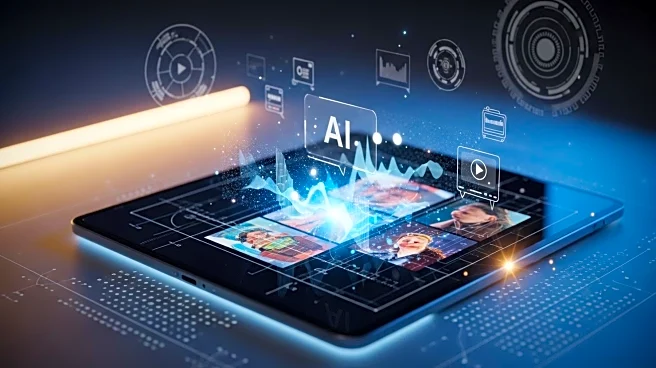What's Happening?
OpenAI has launched its Sora 2 AI-video app, which has sparked concern among Hollywood studios due to its text-to-video generation capabilities. The app's ability to create video content from text prompts has raised issues regarding intellectual property rights, leading to objections from major studios. In response, OpenAI has adjusted its copyright policies to address these concerns, particularly in handling prompts related to sensitive categories of AI-generated content. CNBC's Julia Boorstin conducted tests on Sora 2 to explore its capabilities and the implications for content creation.
Why It's Important?
The introduction of Sora 2 by OpenAI represents a significant development in AI technology, particularly in the realm of content creation. Hollywood studios are worried about the potential impact on intellectual property rights, as AI-generated content could challenge traditional media production and distribution models. This development could lead to shifts in how content is created and consumed, affecting stakeholders in the entertainment industry, including filmmakers, producers, and copyright holders. The adjustments made by OpenAI to its copyright policies highlight the ongoing dialogue between technology developers and content creators regarding the ethical and legal use of AI.
What's Next?
As OpenAI continues to refine its Sora 2 app, further discussions and negotiations between technology companies and Hollywood studios are likely. These conversations may lead to new industry standards or regulations governing AI-generated content. Stakeholders in the entertainment industry will need to adapt to these changes, potentially exploring new business models or collaborations with AI developers. The evolution of AI technology in content creation could also prompt legal challenges or policy updates to protect intellectual property rights.
Beyond the Headlines
The launch of Sora 2 raises broader questions about the role of AI in creative industries. Ethical considerations regarding the use of AI in art and media are becoming increasingly important, as technology blurs the lines between human and machine-generated content. This development may influence cultural perceptions of creativity and originality, prompting debates about the value and authenticity of AI-generated works. Long-term, the integration of AI in content creation could redefine artistic expression and the relationship between technology and culture.








